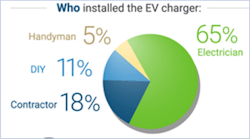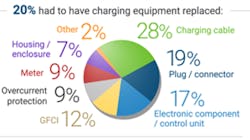It is the mission of the Electrical Safety Foundation (ESFI) to keep consumers safe as they utilize emerging technology. That includes electric vehicle supply equipment (EVSE). The shift from traditional vehicles to electric vehicles (EVs) has been in progress since the introduction of hybrid vehicles in the early 2000s, but because of initiatives from the government, the transition has become an urgent driving force towards an electrified future. This unavoidable development requires utility fleet managers to be prepared and understand the risks the electrified future may bring.
ESFI recently surveyed EV owners to gauge their understanding of EVs and EVSE, or EV charging stations and chargers. The goal of the survey was to identify safety gaps related to emerging technology to ensure consumers are safe while operating and charging their EVs. The survey focused on residential charging systems, but the safety concerns are universal. Here is a summary of what we discovered.
Electric Shock
The survey results show that over 50% of the electrical systems in homes are not ready for EV charging. Respondents agreed that safety needs to be the top priority when installing and using EVSE. The majority of EV owners – 75% – have not had any charging issues, but 8% have received an electrical shock. Several responses highlighted various safety considerations, from the installation location to the use of certified equipment.
When survey participants were asked about preparing their homes for EVs, 63% said they scheduled a home inspection before EVSE installation, while 54% needed an electrical panel upgrade. Many respondents mentioned the convenience of having a home EV charger, focusing on the benefit of charging overnight and eliminating reliance on public charging stations, as many cited problems with finding available charging stations. This included a general scarcity of charging stations, stations occupied by non-EVs, or stations in inconvenient locations. Respondents expressed dissatisfaction with the time it takes to fully charge an electric vehicle, which is problematic when charging infrastructure is scarce or while on a long trip.
Charging Cables
ESFI recommends only using manufacturer-approved charging cables. Non-approved adapters can bypass safety features installed in manufacturer-approved chargers. They can also cause shocks, fires, and even damage your car’s battery. When respondents were asked about EV adapters, 45% said they had purchased an adapter, while 53% had not. “We are encouraged by the survey findings, as customer safety is our top priority as we seek an electrified future,” said John DeBoer, head of Siemens eMobility, North America. “We advise the public to only purchase certified equipment from trusted sources, check electrical manufacturers websites, and find authorized retailers and installers.”
ESFI reminds fleet managers to follow the manufacturer’s instructions when charging an EV. Inspect your charger prior to charging, and never use it if it’s damaged. Extension cords should never be used; only use manufacturer-approved charging cables. Do not alter or modify your charger, battery, or electric vehicle. Always remember to properly store your EV charger to avoid water and other damage. When parking in a public EV charging spot, be aware of your surroundings so you don’t run into a charger. For additional free EV safety resources, you can share throughout your community, visit esfi.org.
Brianne Deerwester is the Communications Coordinator for the Electrical Safety Foundation a leading authority on workplace electrical safety. Brianne handles all traditional and social media, promoting electrical safety at home and in the workplace. Each work environment presents different electrical hazards. ESFI’s workplace safety materials provide information to help employees make safe choices every day and tips for creating a safer workplace, whether work takes place in an office, on a job site, or in a manufacturing setting.
For more information the Electrical Safety Foundation and to receive free-to-share materials, which can be spread throughout your workplace and community, visit esfi.org.
About the Author
Brianne Deerwester
Brianne Deerwester is the Communications Coordinator for the Electrical Safety Foundation a leading authority on workplace electrical safety. Brianne handles all traditional and social media, promoting electrical safety at home and in the workplace. Each work environment presents different electrical hazards. ESFI’s workplace safety materials provide information to help employees make safe choices every day and tips for creating a safer workplace, whether work takes place in an office, on a job site, or in a manufacturing setting.


